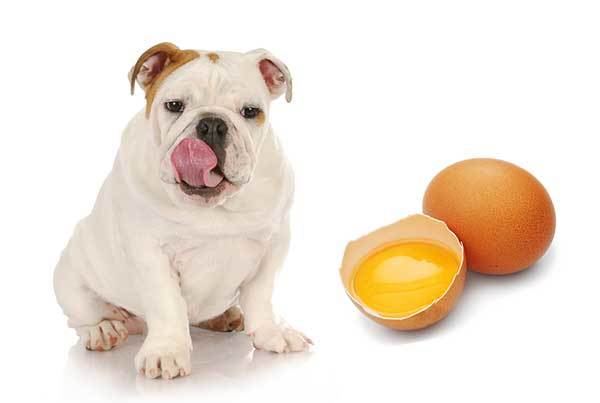Images of dogs begging for human food aren’t uncommon in many homes today. And neither are those of dog owners happily sliding some human foods to their canine friends.
If you own a dog (or any pet for that matter), you probably already understand the position of experts with regards to feeding human foods to these animals.
Essentially, there are certain human foods that are considered unsafe for dogs, and those that dogs can freely eat. However, even for people foods that are deemed safe for canine consumption, experts usually emphasize on moderation.
But what position do professional vets hold with regards to eggs for dogs? Should dogs have eggs every day? Can I Give My Dog Eggs Every Day?
Yes, dogs can have eggs. Not only are eggs safe for your dog, but you can offer eggs to your pooch on a daily basis. All factors held constant, eating eggs every day will not pose any immediate health concerns to your canine friend.
But as you shall find, there are a few things you must take care of to ensure this yummy and nutritious food doesn’t end up causing your dog more harm than good.
Read on as we attempt to address all the related questions about eggs for dogs.
What Can Dogs Eat?
One of the frequently asked questions by dog owners is, can dogs have eggs?
As we’ve already mentioned, dogs can happily have eggs. To dogs, eating eggs comes naturally, as it is all part of their adaptation.
Now, it’s important to remember that dogs are carnivorous animals, which means they mainly survive on a diet of animal protein.
Before domestication by man, dogs relied purely on hunting wild animals. Hardly was there any fruits and vegetables in their diet.
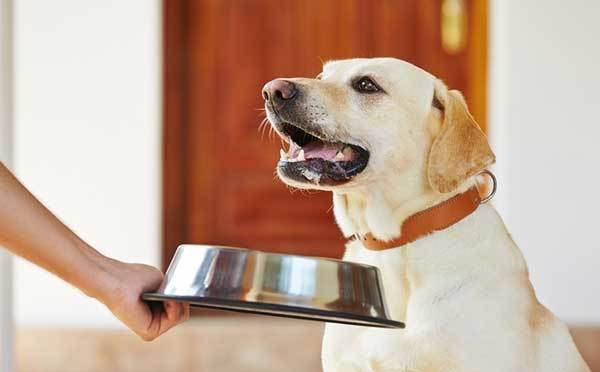
However, after domestication, most dogs have had to contend with eating human foods, including those that are not necessarily animal protein. That’s why it’s a bit difficult to classify the modern domestic dog as an obligate carnivore.
As a carnivore, egg is one of the foods that dogs enjoyed so much. Perhaps due to the fact that it was an easy meal, provided the nests were accessible.
If you rear birds or poultry and haven’t trained your dog not to steal poultry eggs, you’ll observe your furry friend sneaking on your birds’ nests and eating the eggs with no problem.
In fact, dogs don’t even bother cracking the shell to access the egg yolk. Instead, they prefer to eat the entire egg.
What Nutritional Elements Do Eggs Have?
There are numerous reasons why you might consider offering your canine friend eggs instead of dog food. To explore the reasons, we’ll first try to examine the nutritional value of eggs.
The following are some of the main nutritional elements that eggs contain, along with how your dog can benefit from each one of them;
1. Vitamin A
Improves your dog’s vision and promotes a healthy skin.
2. Vitamin B7
Also known as biotin, Vitamin B7 also promotes the health of your dog’s coat.
3. Vitamin B12
Used in the production of red blood cells.
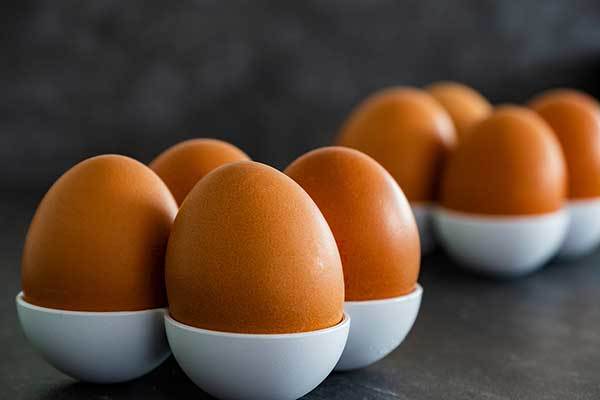
4. Calcium
Calcium is an essential mineral that boosts the health of your dog’s bones and joints. It also promotes the function of your dog’s nervous system.
5. Vitamin D
Do eggs have vitamin D? Yes, eggs do have vitamin D. The vitamin enhances the bioavailability of calcium in your dog’ food.
6. Phosphorus
Works alongside calcium to promote healthy bones and joints.
7. Pyridoxine
Plays a role in various metabolic processes.
8. Riboflavin
Riboflavin helps to convert fat into energy, which benefits your dog in two ways.
First, it reduces the accumulation of fats in your dog’s bloodstream, which could lead to a wide spectrum of medical conditions. Examples of fat-related diseases for dogs include heart and cardiovascular diseases, obesity, diabetes, pancreatitis, and digestive complications.
Secondly, converting fat into energy ensures your dog receives continuous bursts of energy, which is useful during playtime. Riboflavin also promotes a healthy dog skin and coat.
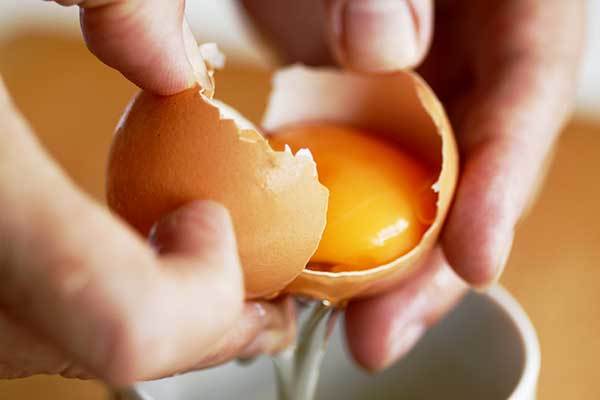
9. Pantothenic acid
Facilitates the synthesis of energy at the cellular level.
10. Iron
Your dog’s red blood cells require iron to help in the supply of oxygen to the various tissues and organs of its body.
11. Selenium
This is an antioxidant that helps to boost your canine’s immune system. It has been associated with lowering the risks of chronic conditions, such as cancer, heart disease, and canine arthritis.
Lastly, eggs also contain proteins and fats. One egg is believed to contain 4.8 grams of fat and 6.3 grams of protein. Fats are the main source of energy for your dogs. It’s also worth noting that eggs have no carbs.
ALSO READ: The Best Calming Dog Treats for Stress and Anxiety Relief
Feeding Dogs Raw Eggs Everyday Versus Cooked – Which Is The Better Option?
It’s not unusual to come across a dog owner asking themselves, can I feed my dog eggs daily?
Yes, your pooch can comfortably eat eggs every day. Perhaps, your next question should now be whether to offer your furry, little friend raw or cooked eggs.
In this section, we will try to compare between raw and cooked eggs in a bid to uncover which is the best one to feed your dog.
So, are raw eggs good for dogs?
As we mentioned at the beginning, dogs were adapted to eat their food raw, which includes eggs. But we also highlighted that their dietary adaptations may have changed slightly upon domestication by man. And that may get you wondering, is it good to feed a dog raw eggs?
Yes, raw egg is believed to contain numerous essential minerals that your dog can benefit from.

However, you could be wondering – are raw eggs better than cooked eggs, and can dogs eat cooked eggs?
Most dog owners who ask this question tend to believe that raw eggs are more nutritious than cooked ones. But do raw eggs contain more nutrients?
Nutritionally speaking, there are no significant differences between offering your pooch raw and cooked eggs. Both contain essential minerals that the dog can enjoy.
According to experts, a half-boiled egg is just as nutritious as raw eggs. So, is it safe to feed dogs raw eggs?
Yes, but when it comes to feeding raw eggs to your furry friend, there are a few things to take care of.
The first main concern with raw eggs it the shell. If you’ve chosen to feed raw eggs to your pooch, ensure the eggshells are finely ground. That will make it easy for the dog to swallow them, thereby preventing the risks of choking.
Secondly, you must ensure that the raw eggs you give your pooch are fresh and not stale. Remember that eggs have a rather limited shelf life. So, only buy eggs that your dogs can eat over a few days to avoid having to deal with rotten eggs.
When it comes to raw eggs for dogs, there are also risks of bacterial infections to contend with. Raw eggs normally contain salmonella.
The good news is that the acid content in a dog’s stomach is usually high enough to deal with salmonella. However, it’s still advisable to only offer your pooch fresh eggs, and ensure you wash the eggs thoroughly if you’re feeding them to the dog raw.
Now that raw eggs isn’t bad for dogs, can I feed my dog raw eggs every day?
There shouldn’t be a problem when it comes to choosing raw egg over dog food. All you have to do is conduct your due diligence, which includes buying the eggs from a trusted source and washing it thoroughly to eliminate salmonella.
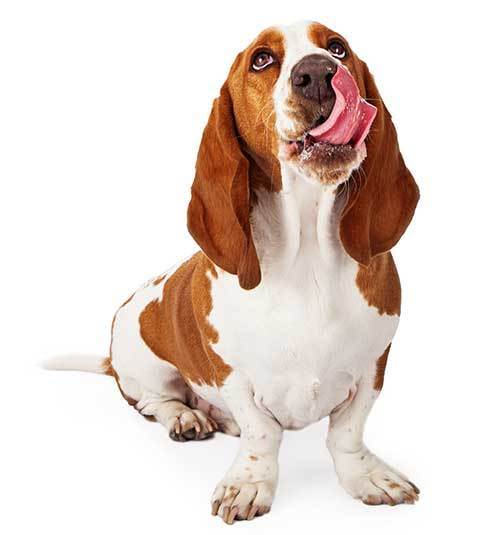
Now, some dog owners might be concerned about their dogs developing bacterial infections from eating raw eggs, and may prefer to give their canine friends cooked eggs instead. But can I feed my dog cooked eggs?
Yes, you can. As we’ve just seen, cooked eggs are just as great for dogs as raw eggs.
However, it’s worth noting that how you cook your eggs could make all the difference in terms of how nutritious the eggs are to your canine friend.
While there are numerous ways on how to cook eggs for dogs, the most appropriate cooking method is to half-boil the eggs. Frying is discouraged as it introduces a lot of fat and salt to the eggs, most of which are potentially dangerous for dogs.
- 10 Benefits in 1 Daily Treat – PetHonesty’s 10-For-1 Multivitamin chews combine a well-rounded blend of the most essential vitamins and supplements…
- Joint Health with Glucosamine – These natural supplement soft chews have high amounts of glucosamine and other joint support ingredients that reduce…
- Improve Digestion with 1 Billion CFU Probiotics – These one a day dog vitamins contain probiotics and pumpkin, which help keep your dog’s digestive…
Last update on 2024-12-21 / Affiliate links / Images from Amazon Product Advertising API
The following is a guide on the proper way to cook eggs for dogs but first, here are some quick tips;
1. Avoid eggshells. While eggshells are safe for dogs if offered raw, they aren’t so nutritious if you cook them. When cooked, eggshells lose their moisture, and feeding them to dogs could lead to digestive complications.
2. Go for farm-fresh eggs. Farm-fresh eggs are usually free of hazardous chemicals.
3. Cook the eggs plain, without adding salt, pepper, garlic, onions, or other seasonings.
4. Cook the eggs thoroughly. This means cooking them long enough to kill salmonella and short enough to keep the nutrients intact.
ALSO READ: The 10 Best Kitchen Accessories for Dog Lovers
Can dogs eat hard-boiled eggs?
Yes, dogs can eat hard-boiled eggs. In fact, hard-boiled eggs are the most popular option of cooked eggs to feed your dog. Also, cooking hard-boiled eggs takes just about 10 minutes.
And now that it’s the most preferable option, the following is a brief guide on how to prepare hard-boiled eggs for dogs;
1. Put your eggs inside a large pot.
2. Add water to the pot, ensuring the water covers the eggs by about an inch.
3. Turn the stove to high heat and place your pot on the stove.
4. As soon as the water is boiling, allow for 10 minutes to ensure the eggs are well-cooked.
5. When they are done, allow the eggs to cool for about 5 minutes and serve them to your dog plain, without salt or seasoning.
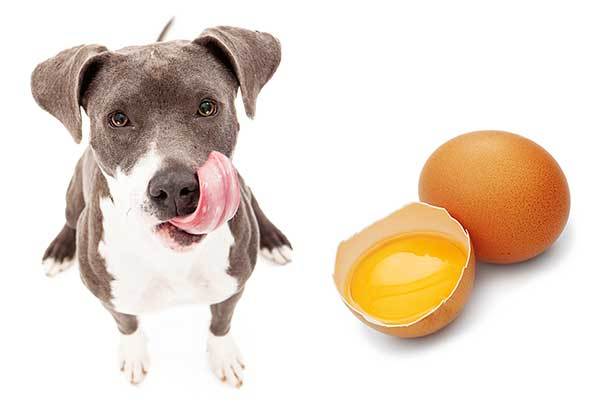
Other Forms of Eggs to Feed Dogs
We’ve already examined cooked and raw eggs, and observed that both are safe for dogs provided you prepare them well.
Now, there are also questions of eggshells and scrambled eggs. We will address each of them and find out if they’re safe for dogs or not.
Can dogs eat eggshells?
Now, many pet parents that feed eggs to their dogs often wonder, are eggshells good for dogs?
Yes, eggshells are perfectly fine for dogs. The shells are a great source of vitamin C, which strengthens your dog’s bones, muscles, and joints. When it comes to eggshells for dogs, the more pertinent question should be how to serve them.
While some dog owners usually leave the shell intact and let their dogs crack it open on their own, experts advise grinding the shell to a powder before feeding it to dogs. That will prevent the risks of choking.
ALSO READ: Can Dogs Eat Calamari? Is It Good for your Dog?
Now, you may be wondering how to prepare egg-shell powder. The procedure is plain and easy.
1. First, collect the shells over a couple of days.
2. Once you have enough eggshells, allow them to dry. You can keep them out in the sun or dry them over an oven for between 60 and 90 minutes.
3. After drying, allow your eggshells to cool.
4. Finally, grind them to a powder using a hand-held grinder or a strainer.
5. Store the shells in an airtight jar and preserve them in your refrigerator. Preservation is key as you don’t want the shells to go bad before you can feed all of them to your pooch.
6. Serve the shells to your dog as required.
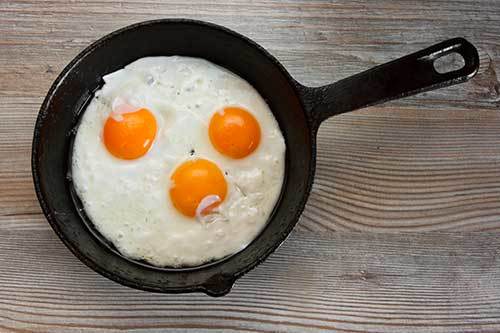
Now, your next question might be, how healthy is it for a dog to eat scrambled eggs?
Indeed, you may be wondering, can I give my dog scrambled eggs every day? Scrambled eggs are safe for dogs as long as you watch what you add to them.
The convention is to feed your dog scrambled eggs that’s free from additives such as oils, onions, garlic, salt, or pepper. Cheese is fine as long as you only add a small amount of it.
Also, don’t eliminate the yolk. Most dog owners believe that egg yolk is high in cholesterol, which could be an issue for dogs. As such, they usually eliminate the yolk. However, egg yolk contains the essential mineral – biotin.
On the other hand, egg whites contain biotin inhibitors. So, feeding your dog egg whites only might lead to biotin deficiency, which is characterized by an unhealthy coat.
- Joint, Heart & Immune Support – These grain free dog skin allergy relief bites also support hip and joint health, immune system function, and…
- Rich Omega-3 Support – Zesty Paws Omega Bites are delicious chewable supplement treats with omega 3 fish oil for dogs with fatty acids (with EPA and…
- Features AlaskOmega – These fish oil omega 3 supplements for dogs are derived from Wild Alaskan Pollock, this premium ingredient provides a clean…
Last update on 2024-12-29 / Affiliate links / Images from Amazon Product Advertising API
Here’s a quick guide on how to prepare scrambled eggs for dogs;
1. Crack the eggs into a bowl.
2. Beat them to blend the yolk and the egg whites.
3. Turn your stove on and set it to medium heat.
4. Place a cooking pan on the stove and add your egg mixture to it.
5. Cook for about 8 minutes, constantly turning them to ensure the eggs are fully cooked.
6. When giving your dog scrambled eggs, start small and observe how the dog’s stomach handle the eggs. Generally, avoid feeding scrambled egg for dog with diarrhea.
ALSO READ: Can Dogs Eat Ketchup? What You Need To Know!
How Many Eggs Can A Dog Eat In A Day?
First, can you feed your dog eggs every day? Yes, but the quantities matter a lot. The number of eggs you feed to your dog every day depends on the age as well as the kind of eggs in question.
So, how many eggs for a 15-pound dog?
One medium to large egg a day would be fine for a 15-pound dog.
What about puppies, and at what age can puppies eat eggs?
Puppies should begin to eat eggs only after they have been weaned. Avoid offering eggs to puppies that still rely exclusively on their mom’s milk.
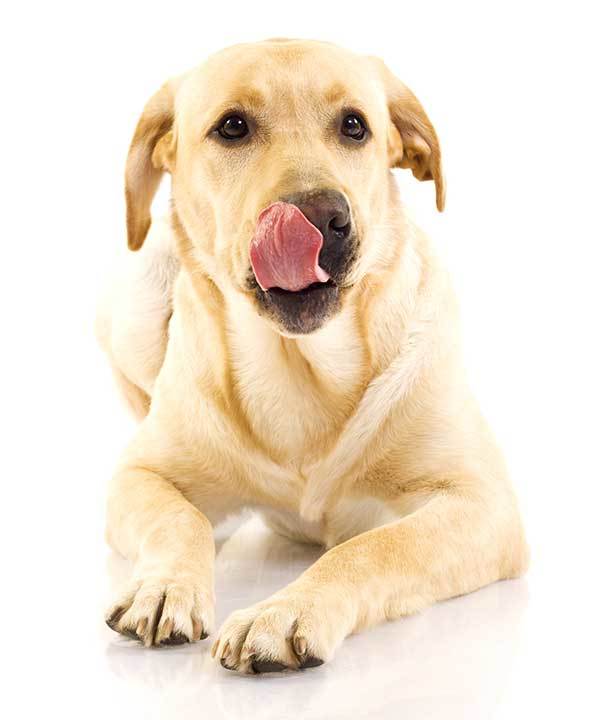
In terms of eggshell powder, half a teaspoon is the recommended quantity that you should give your pooch every day.
Whatever happens, remember to feed eggs to your canine friend only as an occasional treat.

Another important factor to consider is the level of activity of your dog. Dogs need enough physical and mental stimulation. Apart from helping to avert boredom and separation anxiety, enough physical exercise also helps your pooch to burn out excess calories.
Dogs that engage in plenty of exercise or take part in sporting activities can comfortably eat eggs every day.
After settling on the ideal portions of eggs to feed your dogs, there’s also the question of the best way to offer eggs to dogs. So, how should you give eggs to a dog?
As we already highlighted, both raw and cooked egg is fine for dogs. However, serve the egg plain without any seasoning or spices. You can choose to serve eggs to your dog as a standalone meal or mix it into the dog’s regular diets.
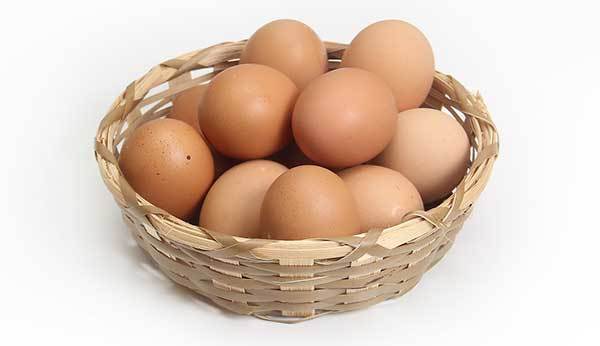
Other Frequently Asked Questions About Eggs for Dogs
Does egg cause gas in dogs?
Some dog owners have often wondered, do eggs make dogs fart?
Yes, eggs, especially raw eggs, can cause flatulence in dogs, which could lead to farting. However, that mostly happens if the dog has a sensitive stomach.
Will dogs get cholesterol issues with eggs?
Dogs do develop cholesterol issues, though it’s seldom related to eating eggs.
Remember that dogs can digest fats in just about 60 minutes. That makes it difficult for the cholesterol in eggs to present any major problems to dogs.
In most cases, dogs that suffer from cholesterol issues from eating eggs are usually those that are also suffering from a condition that prevents them from digesting fats efficiently.
One such condition is hyperlipidemia, which is characterized by vomiting, diarrhea, and abdominal pains.
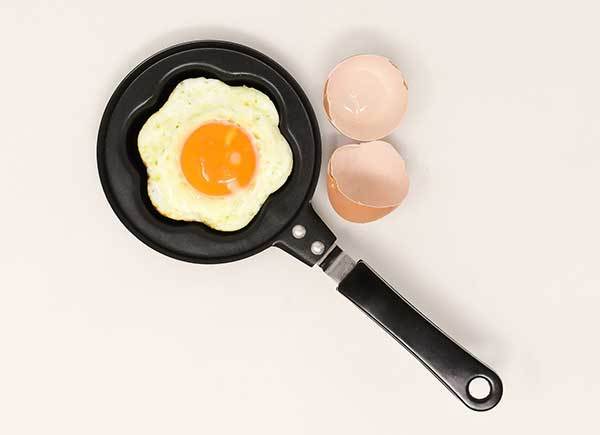
Can dogs eat eggs when they are sick or recovering?
Yes. Not only are eggs excellent immune-boosters for a sick or recovering dog, but they’re also great for increasing your dog’s appetite.
Experts particularly recommend feeding eggs to dogs that are suffering from anemia or protein deficiency.
Can eggs give a dog diarrhea?
Some people usually wonder, can eggs cause diarrhea in dogs?
No. On the contrary, eggs can help to relieve diarrhea in dogs. However, only give your dog boiled egg as a remedy for diarrhea, as raw eggs might escalate the condition even further.
Are eggs good for all dogs?
Unfortunately not. First, puppies shouldn’t have eggs. Also, dogs that are allergic to eggs shouldn’t have them.
Some of the common egg allergy symptoms include itching, difficulty breathing, and gastrointestinal complications.
- One (1) 13 lb bag of ACANA Singles Limited Ingredient Duck and Pear Dry Dog Food
- Grain free** dog food features 65 percent*** high-quality duck ingredients and 35 percent**** fruit, vegetables and nutrients
- A fiber-rich blend of pears, sweet potatoes and pumpkin help provide dog digestive support
Last update on 2025-01-03 / Affiliate links / Images from Amazon Product Advertising API
So, Can You Feed a Dog Eggs Every Day?
Healthy, adult dogs can comfortably eat eggs every day, and there shouldn’t be any immediate health concerns to worry about. Just ensure you feed your pooch eggs in moderation.
Checkout Our Favorite Dog Products
1. BEST PUPPY TOY
We Like: Snuggle Behavior Toy with Heart Beat & Heat Pack – Ideal toy for new puppies.
2. BEST DOG TRAINING PROGRAM
We Like: Doggy Dan The Online Dog Trainer – Stop any dog problem and raise the perfect puppy with The Online Dog Trainer.
3. BEST FOOD FOR DOGS AND PUPPIES
We Like: Victor Super Premium Pet Food – Ideal for growing puppies and pregnant or lactating females. Also provides sustained energy for sporting dogs and dogs with high physical demands.
4. BEST DOG DNA TEST
We Like: Embark Dog DNA Test – Embark screens for over 250 dog breeds + tests for 170+ genetic diseases including MDR1 drug sensitivity, glaucoma, degenerative myelopathy, and dilated cardiomyopathy, some of the most common adult-onset diseases in dogs.
5. BEST DOG PUZZLE TOY
We Like: Outward Hound Interactive Puzzle Toy – Every dog loves chasing squirrels at the park. The Outward Hound Hide-a-Squirrel Puzzle Toy gives your dog the same feeling as though he was outdoors chasing live squirrels.
6. Best Vacuum to Tackle Pet Hair
We Like: ORFELD Cordless Vacuum – Engineered for homes with pets. With features and tools that dig out dirt, hair and allergens everywhere your pet gets.

